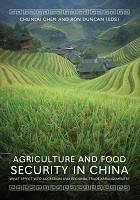Agriculture and Food Security in China
What Effect WTO Accession and Regional Trade Arrangements?
Author(s)
Chen, Chunlai
Duncan, Ron
Language
EnglishAbstract
China’s accession to the World Trade Organization (WTO) has had profound consequences for the structure of its economy, and there will many more before the full benefits of an open trading regime will be realised. Agriculture and Food Security in China explains the background to China’s WTO accession and links accession to reforms beginning as far back as 1979. The book highlights China’s policymakers’ decision to move away from protectionism and gain self-sufficiency, and illustrates how China’s step away from direct participation in the agricultural sector to indirect regulatory involvement and liberalisation could encourage further economic growth.
Yet not all economic growth is cost-free. Agriculture and Food Security in China explores the short-term impacts of WTO accession as well as the mid and long-term implications of greater market involvement at an economy-wide and regional level. Growing divides between coastal and inland regions—and differences in rural and urban growth—will require a better understanding of the consequences of greater market dependency.
Agriculture and Food Security in China adds to the existing knowledge of China’s agricultural growth as well as the impacts and interrelationships between WTO accession and China’s participation in other regional free trade agreements.
Keywords
world trade organization; agriculture; policymakers; foreign trade regulation; international trade; china; Association of Southeast Asian Nations; Balance of trade; Labour economics; Long run and short run; Tariff; Vegetable oilDOI
10.26530/OAPEN_458797ISBN
9781921313646OCN
236205207Publisher
ANU PressPublisher website
https://press.anu.edu.au/Publication date and place
Canberra, 2008Classification
International law: transport, communications and commerce
Agricultural law


 Download
Download Web Shop
Web Shop